Search inside Resources
Methodologies
- E-Learning (5)
- Reports/Presentations (52)
- Training modules/Database (20)
Topics
Author: Lt Col Dr Jarosław Rychlik, Professor, University of Justice
Introduction
Within the adopted plan, the following aspects of suicide risk are distinguished:
Read more here
Author: Siim Poll
These are examples of a theory part in the final exam for vocational education level students. They start working in prison as guards.
It is based on Estonian legal regulations but is easily transferrable to any other country’s frame.
The student must analyse in written manner the case and figure out whether the prison officers act correctly.
Read more of part 1 of the exam here
Part 2 of the exam can be found here
Contributed by the Centro de Estudios Jurídicos y Formación Especializada
Authors:
Manel Capdevila and Miguel Marrufo (coordinators);
Laura Ruiz, Ruth Díez, Berta Framis, Carles Soler, Aroa Arrufat (Centre for Legal Studies and Specialised Training – CEJFE);
Laura Salvanyà; Carmen Macarrón; Joaquim López, Joan Pere Queralt (QC Prison)
In 2016, Centre Penitenciari Quatre Camins (hereinafter, “QC Prison”) launched the Violent Behaviour Evaluation Programme to improve its work with people convicted of violent offences based on the RNR model. Implementing the programme entailed moving away from an offence-based rehabilitation model to one based on inmates’ risks and criminogenic needs. Andrews and Bonta’s RNR model (2007) is based on three principles: Risk, Necessity and Responsivity.
The first of these, risk, relates to the importance of adapting the type of intervention to the level of risk posed by each offender, increasing the intensity of each individual’s treatment and supervision directly in accordance with their level of risk: the greater the risk, the greater the closed-regime intervention; the lower the risk, the lower the level of intervention. Secondly, the need principle entails working with each person on the factors that directly affect their likelihood of reoffending in their specific case.
Thirdly, responsivity indicates that the type of treatment should be tailored to each individual’s characteristics and learning styles, taking into account the gender perspective, cultural differences in the case of those coming from abroad, language difficulties and each person’s intellectual and learning abilities. Finally, the authors present clear evidence that interventions are more effective when they continue to be applied in the community.
Read more here
Contributed by the Ecole nationale d’administration pénitentiare Département Gestion et Management
For the first time, the AFA and the Ministerial Statistical Service for Internal Security (SSMSI) are jointly publishing a study on breaches of probity. This publication is part of the objectives of the National Multi-Annual Anti-Corruption Plan (PNPLC) 2020 to 2022, published on 9 January 2020. In France in 2021, the police and gendarmerie recorded 800 breaches of probity. Between 2016 and 2021, they increased by 28%, or an average of 5% per year.
These offences include corruption, influence peddling, illegal acquisition of interest, misappropriation of public funds, favouritism, and embezzlement. The increase in breaches of probity is linked in particular to corruption offences (+46% over the period), which account for almost a third of all such breaches. Public corruption accounts for 68% of these cases. Active bribery (17%) is slightly more common than passive bribery (12%). Other offences are often committed in conjunction with offences related to breaches of probity; half of these related offences involve fraud or deceit.
Read more here
Contributed by the Ecole nationale d’administration pénitentiare Département Gestion et Management
It is a particularly important moment – one that can only succeed if proper communication is established. An interview is a dialogue in which one person seeks to obtain information from another, with the latter’s consent. Proper communication means being able to express your objectives, expectations, and questions sincerely.
This also means creating the right conditions for a calm relationship. Finally, it means knowing how to listen, understand and respect. During the interview, we look at the individual as a whole, his feelings and his environment.
The aim is to analyse the needs, aspirations, values, and representations of individuals. We must not try to influence or change their opinions, except in exceptional circumstances. The supervisor conducting the interview must remain neutral.
Read more here
Contributed by the Ecole nationale d’administration pénitentiare Département Gestion et Management
Technology is omnipresent in our daily lives; its use has become commonplace and its limits less and less questioned. Redefining our relationship with time and space, it is often presented and perceived as promoting productivity and giving us a sense of freedom, immediacy, and ease. The appeal of technology is not new, and it’s growing all the time; this is particularly true of security technologies, which are increasingly present in public discourse, policy, and practice.
This article looks at the deployment of technology in penitentiary environments through a socio-technical approach that goes beyond a functional study. It is based on a reflection from my doctoral thesis on the privacy of incarcerated persons in Québec provincial prisons, which led me to question technology as a potential solution to intrusive practices. The text that follows is an extension of this reflection to the French penitentiary context and invites readers to question the use of technology in prisons: beyond their functionalities, what do they produce? It does not seek to engage in what would necessarily be a sterile and reductive debate for or against technology”, but attempts to offer an analysis that goes beyond the material aspects of technology to understand it in all its complexity.
Read more here
The 16th annual EPTA conference 2023 took place in Tallinn, Estonia on 26 – 27 September. The conference was on the following topic: “Lessons Learned: Overcoming Teaching Challenges – Strategies and Solutions for Effective Education”. The conference will be kindly hosted by the holding president, College of Justice, Estonian Academy of Security Sciences.
The conference ‘Judicial Training: The Right Skills to Embrace the Digitalisation of Justice’ took place in a hybrid setting in Brussels and online, on the 26-28 April 2023. The conference report has now been published. (more…)
The Lithuanian Prison Service is implementing a project, “Development of Quality-Based Lithuanian Correctional Service System,” under the 2014-2021 Norway Grants’ Justice and Home Affairs Program. The project aims to enhance the quality of services in Lithuanian correctional institutions to meet European and international human rights standards. In 2023, Lithuania published the first Handbook of Dynamic Security in Prisons to introduce the concept to correctional staff, share knowledge, and foster a common understanding of dynamic security. (more…)
This training was hosted by the Training Centre for the Prison Staff in Croatia. From 3 – 5 October 2023, the training covered a number of different important lessons when working with young offenders.
The goal of this training is to raise awareness among prison officers about the specifics of working with young people in the prison system. After the training, participants will understand better the development process of young people as well as behavioral disorders.
The focus was also on understanding the reasons for establishing a quality relationship as a basis for working with young offenders. Good practices of communication skills and teamwork were exchanged among the participants. As part of the benefits of the training, a better insight into the importance of mental health and self-awareness was also addressed.
Click to view the training presentation.
On 22-26 May in Târgu Ocna, the National Correctional Officers Training School hosted a training on Hostage-taking situations in the penitentiary environment with support from the Netherlands Helsinki (NHC) and EuroPris. As part of the EPTA II project, which is co-funded by the European Union’s Justice Programme, the EPTA network organized several cross-border trainings, where selected EPTA members hosted training in Ireland, Romania, and Croatia (will be hosted in 3-5 October) for participants from other EPTA member organizations.
If you are interested to read about the Cross-Border Training on Restorative Practice in Ireland Portlaoise, 17-18 May 2023, click here.
Click here to view the full report from this Training. (more…)
On 17-18 May in Portlaoise, the Irish Prison Service hosted a training on Restorative Practice, with support from the Netherlands Helsinki (NHC) and EuroPris. (more…)
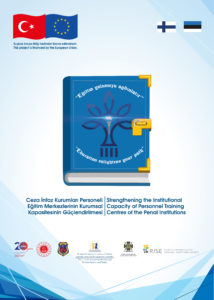
A joint twinning project „Strengthening the Institutional Capacity of Personnel Training Centres of the Penal Institutions in Turkey“ between Finland, Estonia and Turkey in 2022. Click here to read the full description about the EU twinning project.
Among other activities, some handbooks and manuals were developed: (more…)

Three interactive E-learnings have been developed by the Swiss Centre of Expertise in Prison and Probation (SCEPP) on the topics of Conflict Management, Protection against infectious diseases and Suicide Prevention. (more…)
Between July 2021 and March 2022 a mapping activity was carried out by The Netherlands Helsinki Committee (NHC), Young Perspectives (YOPE) under the Giving Back project. In the Giving Back project, the NHC, YOPE and Dutch Custodial Institutions Agency strive to improve the child-friendly practices of European youth justice professionals working in Juvenile Justice Facilities (JJF’s) and to stimulate child-centered learning among European Union Member States. Part of the project entailed a mapping report which found proven or promising European practices of youth participation based training methods for professionals working in JJF’s. The first result of the mapping activity is a document that presents the outcomes of the mapping activity and can be found here.
NHC and YOPE want to continue to learn and build upon this mapping activity. So, to organisations that operate within the EU and want to share their expertise with the research team: please feel free to share your initiative with bwohlstetter@nhc.nl
Next to the mapping activity, NHC and YOPE will:
1. Visit three countries with promising practices that were identified during the mapping exercise.
2. Host online learning sessions that will allow the broader European Network to participate in an international exchange of promising youth-participation based practices.
3. Create a manifesto advocating for the inclusion of young people with lived experience in the development and implementation of penitentiary staff training.
The final report of the research produced and funded by CEP on ¨Probation officers’ knowledge of, and attitudes to, mental illness in Europe¨ is now available.
The study and the final report were conducted by Professor Charlie Brooker – Royal Holloway, University of London and Professor Karen Tocque – University of Chester. (more…)
This manual aims to assist criminal justice practitioners to ensure that community-based measures are used effectively and do not discriminate against minority or marginalised groups, or those that experience vulnerability in the criminal justice system due to specific personal characteristics, background or circumstances. (more…)
During the last two years, the needs coming from the COVID-19 pandemic put our academies in the centre of many glances by the Prison Services. There was the need for recruiting and training, in a very short period of time, new staff for attending the extra demands provoked by the pandemic, we all changed our routines of working, introducing “online” tools as the main way to provide training, etc. (more…)
These recommendations and guidelines are intended to serve as an initial guideline at the time of disclosure or discovery of sexual violence experienced by children and adolescents (CA) and are focused on two groups: a) the family and people close to the CA and b) the teams of professionals that are accompanying them from the revelation, with a clear purpose of reducing secondary victimization. (more…)
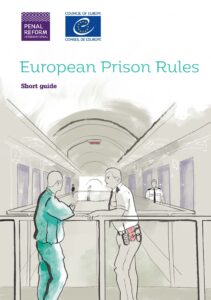
The European Prison Rules, developed by the Council of Europe, set out standards on the management of prisons and the treatment of people in prison. They apply in all 47 Council of Europe countries and provide critical guidance to prison staff on how to protect and safeguard the human rights of people in prison – from admission to release. (more…)
Under the direction of Guillaume Brie and Jean-Philippe Mayol. Interdisciplinary Center for Applied Research in the Penitentiary Field, 2021.
The thematic file questions the transition from the notion of dynamic security to its concept, then from the concept to its policy, that is to say to a vision of security in detention in addition to the more classic and usual practices contained on security “passive” and “active” safety. (more…)
The EPTA Annual Conference was organized on 21-23 September 2021 in Warsaw hosted by the Polish Academy of Justice (SWWS) on the theme “Prison Service in Time of COVID: Impact on training and teaching”. (more…)
The EPTA Annual Conference was organized on 21-23 September 2021 in Warsaw hosted by the Polish Academy of Justice (SWWS) on the theme “Prison Service in Time of COVID: Impact on training and teaching”. (more…)
This Handbook is one of a series of tools developed by UNODC to support countries in the implementation of the rule of law and the development of criminal justice reform. (more…)
EPTA’s online event took place on 17 May 2021 that brought together an audience to discuss the Training Manual on Managing Difficult Inmates that was published by a group of experts from the Special Interest Group 3. (more…)
EPTA’s first online event took place on 23 April 2021 that brought together an audience to discuss the Training Manual on Leadership & Management that was published by a group of experts from the Special Interest Group 1. (more…)
A new free course developed by the European project B-COMPETENT helps prison staff, managers and prison trainers improve knowledge and awareness of issues related to human rights and needs of Foreign Nationals in prison.
The following documents are modules on leadership and management that are used at the National Correctional Administration Academy (ENAP). The modules are in French language.
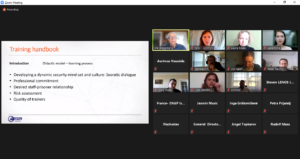
EPTA’s online event took place on 11 May 2021 that brought together an audience to discuss the Training Manual on Dynamic Security that was published by a group of experts from the Special Interest Group 2. (more…)
The Swiss Centre of Expertise in Prison and Probation (SCEPP) developed an interactive E-learning module on Dynamic Security. It has been created to inform (future) prison staff the basic knowledge of dynamic security and to show its implementation in practice. The e-learning module is freely accessible and takes about 60 minutes. It is currently available in four languages (English, German, French and Italian).
Click on the images or links below to view the e-learning module in one of the four languages. (more…)
The three Special Interest Groups (SIGs) developed training manuals based on European and international minimum standards. The topics of these training manuals are Leadership & Management, Dynamic Security and Managing Difficult Inmates. Within each topic, best practices, a training handbook and a recommendation of the minimum standards have been developed. All reports are available in English, French, German, Spanish and Italian. A printable version and guidelines to print the training manuals is available here.
Publication and compilation of these document were made possible with the financial support of the European Union’s Justice Programme (2014- 2020), as part of the project ‘Tackling Gaps in Cross-Border Cooperation for Penitentiary Training Academies’, which was coordinated by the Netherlands Helsinki Committee (NHC). (more…)
Click here to download “Covid19. Confinement et prison : Regards croisés des enseignants-chercheurs du Cirap sur la crise” (Covid19. Confinement and prison: Crossed views of CIRAP teacher-researchers on the crisis). The report is in French.
Click here to download a report called “Dire et prédire la radicalisation. Le cas de la prison” (Inform and predict radicalisation. The case of a prison) written by Guillaume Brie et Cécile Rambourg, June 2020. The report is written in French.
Click here to download the research on “Meaning of work among supervisory staff: What do the respect modules teach us?” written by Lucie Hernandez, July 2020.
The article is only available in French, the original title is “Sens du travail chez les personnels de surveillance : Que nous apprennent les modules de respect?”
Click here to view the full report in ENG, ES and FR.
For some years now, methods for managing people in detention have been rethought to be in line with legislative changes (the French “prison law” of 24 November 2009 on the meaning of the sentence; the French law of 15 August 2014 on the purposes of serving a sentence). (more…)
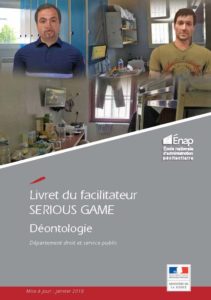
Pedagogy must keep up with modern times and communication of students in vocational training. The “serious game” is an illustration of how teaching methods continue to evolve. It makes it possible to involve students through a playful approach. (more…)
Click here or on the image to view the infographic “Choosing one’s professional positioning”:
To view the full report on Professional Conduct in French, “Un code de déontologie du service public pénitentiaire”, click on the image.


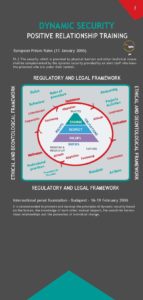
This is a compilation of testimonials, infographics and best practices on dynamic security. The booklet is available in English, French and Spanish, compiled by National Correctional Administration Academy (ENAP).
Click below to download the booklets.
In 2020, under the Slovakian Presidency, the General Directorate of the Corps of Prison and Court Guard organised the EPTA Annual Conference on 28-29 September 2020 in a format of an online conference.
This catalogue compiles all research carried out integrally or partially financed by the Centre for Legal Studies and Specialised Training since 1987. (more…)
Through an Online Stress Management and Resilience Program, the International Association for Human Values Peacebuilding (IAHV) provides tools that you can quickly put into practice to help sustain you during this time and to improve stress management, personal resilience, wellbeing, performance capacity and prevent burn-out. IAHV is now offering this program free of charge to frontline workers during the COVID-19 pandemic.
This year, the EPTA Annual Conference was hosted online on 28-29 September by the Slovak General Directorate of the Corps of Prison and Court Guard. (more…)
This document is an outline of a training course written by Gary Hill, who has helped write training manuals for correctional workers in more than 40 nations. The material used here has been gathered by a review of more than 100 training programs conducted in individual Correctional Staff institutions, training academies and educational institutions around the world. (more…)
This document has been drafted on the basis of the document produced in October 2017, presenting training in the fight
against radicalization for prison management, surveillance, rehabilitation and probation staff.
Click here to view the ENAP Training on Radicalisation.
The United Nations Office on Drugs and Crime (UNODC) developed an e-learning course platform about the Nelson Mandel Rules. Click here to enter the e-learning course. (more…)
Tags: Nelson Mandela Rules; UNODCWorking with foreign prisoners is an increasing challenge for European prisons. To assist prison staff, managers, prison trainers and others who work with and are responsible for foreign prisoners, an innovative and engaging online E-Learning course has been created by EuroPris in conjunction with the Council of Europe HELP Programme and the University of Nottingham. Click here to access the E-Learning Module on Managing Foreign National Prisoners.
The 12th Annual EPTA Conference was organized by the National Correctional Officers Training School Târgu Ocna, Romania, during 18th – 19th of June 2019. (more…)
(Adopted by the European Committee on Crime Problems in April 2019)
The Council of Europe issued today a new set of Guidelines aimed at assisting its 47 Member States in improving the recruitment, education, training and professional development of prison and probation staff. (more…)
Click below to read the compendium of key texts in English and French, relating to prisons and community sanctions and measures from the Council of Europe, published on March 2019. (more…)
Click here to download “Le raisonnement organisationnel appliqué à l’analyse des prises en charge des délinquants sexuels” (Organizational reasoning applied to the analysis of care for sex offenders), Guillaume Brie, September 2019.
The Guidelines were developed as a follow-up to the 22nd Council of Europe Conference of Directors of Prison and Probation Services (Norway, June 2017). The text was drafted by the Council for Penological Co-operation (PC-CP) between 2018 and 2019. The Guidelines were adopted by the European Committee on Crime Problems (CDPC) at their 76th plenary meeting (25 April 2019).
During the French Presidency, ENAP organised the Annual Conference on 13-14 June in 2018 in Toulouse, France. (more…)
The training guides for the different professional penal execution collectives use highly innovatory methodologies, since they perform a systematic task of indentifying professional competences, which are directly related to the behaviours considered indispensable for carrying out the activity correctly. (more…)
EuroPris has cooperated with the Radicalisation Awareness Network (RAN) to collect trainings that were developed in a number of European Prison Services dealing with radicalisation issues. (more…)
The UN Standard Minimum Rules for the Treatment of Prisoners (SMR) are often regarded as the primary source of standards in relation to treatment of all persons in detention. They also represent a key framework for oversight bodies to assess the treatment of prisoners. (more…)
On 20-21 September 2017, the EPTA Annual Conference took place in the main training institute of the Swiss Prison Training Staff Centre (SPSTC) in Centre Loewenberg Morat.
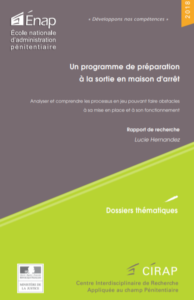
Click here to open the Evaluation d’un programme de préparation à la sortie (A preparation programme for release from the remand centre), written by Lucie Hernandez, 2017. The report is written in French.
Click here to view “Recherche-action sur les programmes de prise en charge des auteurs d’infractions à caractère sexuel” (New issues related to the treatment of sex offenders. Mutually exclusive dimensions). Guillaume Brie, 2017. The report is written in French.
On 15-16 November 2016, the annual conference of the European Penitentiary Training Academies took place in the main training institute of the Polish Prison Service in Kalisz.
Click here to download the report Etude des obligations applicables en milieu ouvert : une analyse de la dimension coercitive de la probation (Study of applicable obligations in open custody: an analysis of the coercive dimension of probation), Clément Margaine, March 2016. The report is in French language.
Italy held the EPTA presidency in 2015 and organised the VIII EPTA Annual Conference. The EPTA Annual Conference took place on 4th-6th of November 2015 in Rome, Italy at the Higher School of Penal Execution “Piesanti Mattarella”. Organised by Higher Institute for Penitentiary Studies (ISSP) (more…)
Radicalisation. Analyses scientifique versus usages politiques (Radicalization. Scientific analyzes versus political uses), Guillaume Brie et Cécile Rambourg, September 2015.
Click here to view the report. The report is written in French language.
Click below to view presentations from the EPTA Annual Conference 2014 (more…)
The workshop on topic Basic training on the prevention of conflict took place during the 7th European Penitentiary Training Academies (EPTA) Conference in Barcelona, 2014. The purpose of this workshop was to establish a training programme on conflict prevention in the prison environment that could be adopted by the various training academies and count towards EPTA accreditation.
The 7th Conference of the European Penitentiary Training Academies (EPTA), organised by the Centre for Legal Studies and Specialised Training (CEJFE) took place in Barcelona, Catalonia, on 25, 26 and 27 June 2014. (more…)
Click below to view the presentations from the 6th EPTA Annual Conference in Portlaoise, Ireland in 2013. (more…)
The 6th EPTA Annual Conference took place in Portlaoise, Ireland on 4th – 6th June 2013.
Some of the key topics discussed during the conference were e-learning, aging inmates, violence prevention, female inmates.
(more…)
Click here to view the report La féminisation à l’épreuve de la prison (Feminisation put to the test of prison), written by Cécile Rambourg in April 2013. The report is written in French.
Click here to view the report Les trajectoires professionnelles des directeurs des services pénitentiaires : conformation à un modèle dominant de carrière (Career paths of prison directors: Conforming to a dominant career model), written by Laurence Bessières, December 2013. The report is written in French language.
The 5th EPTA Annual Conference took place in September 2012 , at the Marneffe, Belgium. Main topics discussed were hostage taking, radicalisation in prisons, what constitutes a good training curriculum. (more…)
Management of the prison institutions is very demanding and responsible job, because of the exceptional complexity of such institutions, as well as their specific position in society. (more…)
Click here to view the report on L’expérience de la formation aux métiers pénitentiaires des travailleurs handicapés (The experience of training to prison trades for disabled workers), written in French by Cécile Rambourg, January 2012.
The 4th EPTA Annual Conference took place in Oslo, Norway in 2011, hosted by the Correctional Service of Norway Staff Academy. (more…)
On April 12, 2010 in Toledo, the heads of the training centres for prison staff in Belgium, Catalonia, Croatia, Spain, France, Italy, Norway, the Principality of Andorra and Romania signed the founding document of the European network in the presence of a representative of the Council of Europe. (more…)
Search inside Resources
Methodologies


Supported by the Justice Programme of the European Union
